Beyond the vote
BVH students and teachers respond to the upcoming presidential election
The 2020 United States presidential election was held on Tuesday, November 3, 2020. The two main candidates running for the position are Donald Trump and Joe Biden.
Democrat, Republican, liberal, conservative, independent, moderate; Bonita Vista High (BVH) students claim all those labels and more. Yet, 98.1 percent of the student body will not be eligible to vote in the upcoming presidential election. Despite this, the student body has their own varied involvement in, and perspectives on the 2020 United States (U.S.) presidential election, which is often dubbed “the most important election of our lives.” Not only have some students associated themselves with the presidential election, but its results will ultimately be inescapable.

Students speak out
As universal the experience of a pandemic can seem, BVH students split their ‘vote’ on most subjects regarding the presidential election in a poll of 478 students conducted by the Crusader on the week of Oct. 12, including the effectiveness of the Trump administration’s COVID-19 response.
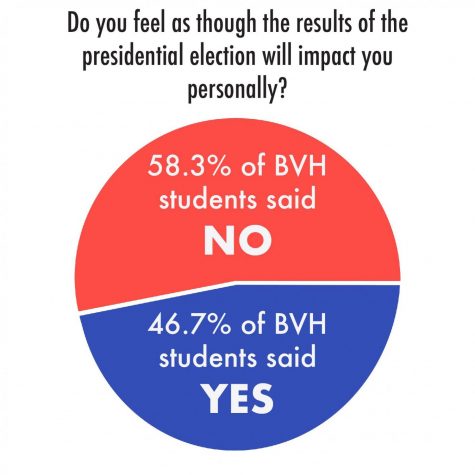
Seventy-three percent of students feel that Democrat presidential candidate Joseph Biden will better manage the current pandemic as president, while 18.2 percent feel Republican candidate and current President Donald Trump will do so. The remaining 8.8 percent of students gave a range of responses, many responding that they felt too uninformed to respond.
“My thoughts on the upcoming election are all over the place to be completely honest. I think whoever wins, America will not be ‘great again.’ If I were able to, I’d vote for Biden because I agree with more of his beliefs. I do not completely support all of him and his ideas but I believe Trump will make life harder for women and minority groups,” senior Alessandra Cabal said.
Cabal agrees with 61.8 percent of students who responded that if they were allowed to vote, they would, or are going to, vote for Biden. However, 19.3 percent said that they are unsure, and 13.2 percent said they would vote for Trump. While students have different reasons for their preference in a candidate, Cabal feels particularly concerned with Trump’s stance on school reopenings.
“Trump believes schools should open up again because we are ‘close’ to getting a vaccine. Even though I would like to go back to school, I still would not feel comfortable. We can’t rely on every student and staff member to follow the safety protocols if we were to go back to school,” Cabal said.
Currently, the Sweetwater Union High School District (SUHSD) has determined that all schools, including BVH, will remain in distance learning for at least until the end of the first semester. According to the White House’s “Opening Up America Again” plan, “schools and organized youth activities (e.g., daycare, camp) that are currently closed should remain closed” until reaching Phase Two, which is “for States and Regions with no evidence of a rebound and that satisfy the gating criteria a second time.” Since releasing the “Opening Up America Again” plan in spring, however, Trump and his administration have repeatedly pushed for the opening of schools despite the state of COVID-19.
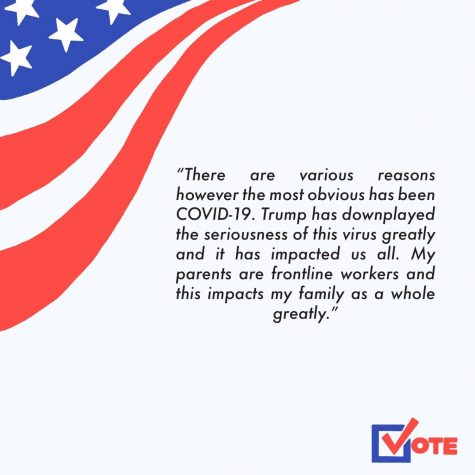
“We know that, for students and their families, they can’t be held captive to other people’s fears or agendas. We have got to ensure that families and parents have options that are going to work for their child and for their children’s education,” United States Secretary of Education Betsy DeVos said based on a White House briefing statement from Aug. 12.
In contrast to Cabal, senior Ethan Alba agrees with Trump’s pandemic response overall, despite what he described as a possible error with lack of promotion of mask-wearing. Alba specifically critiqued the early inconsistent messages coming from the director of the National Institute of Allergy and Infectious Diseases Anthony Fauci, M.D. While in March, Fauci stated that masks were not the most effective in combating the virus, and by June he had corrected his previous statement, as described by Headlines & Global News.
“I do believe that [Trump] did do everything that he could have. Maybe he could have supported wearing masks a little bit, but when he was not supporting masks, Dr. [Anthony] Fauci actually said masks don’t work and now he’s gone back on that statement and said masks do work. But, going back to February, [Trump] did block travel from China which he got completely bashed for. He was called xenophobic [and] racist, just because he blocked travel from China even though that’s where the virus was,” Alba said.
Alba sees fair evaluation of politicians as a critical step when forming political endorsements. Thus, as a Conservative and Trump supporter, Alba still finds certain points where he feels he would draw the line.
“[If the candidates voice] any truly racist policies it’d kind of be like ‘Okay, we really need to reconsider who we’re voting for,’ and I don’t think that [Trump’s] had any really racist policies. If he [didn’t] support the LGBTQ community, [then] that’s another thing where that’s a whole group of people that you’re just not supporting,” Alba said. “That’s when support would stop for me. Also, if any of the sexual assault allegations [were] 100 percent confirmed to be true, I think that’s when [there would be] no more support from me, because it’s not right to assault anyone, male or female.”
When considering both LGBTQ+ rights and womens’ rights, numerous students with those identities anonymously responded, in part, to the Crusader’s polls by voicing their concerns with four more years of Trump presidency. While Alba aligns with the 13.2 percent of BVH students who responded they would, or will, vote for Trump, he recognized that for some people with differing identities, Trump may not be the best president.
“I don’t think that Donald Trump is the best president for undocumented Hispanics because he does believe in border security,” Alba said. “If [an undocumented person is] a contributing member to the United States, and they’re paying taxes, I don’t think that – if they’re undocumented that could mean [that] they lost their papers and I think that’s not quite understood through Donald Trump. But I do think the pros outweigh the cons.”
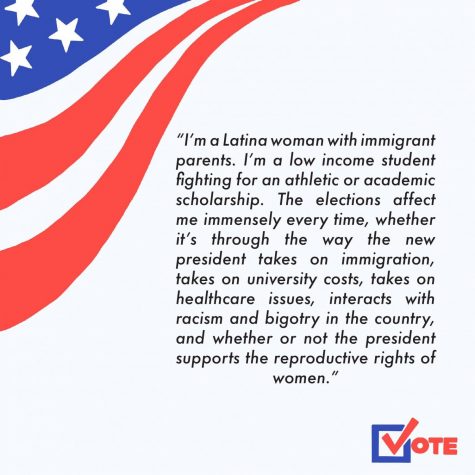
Contrastingly, 69.7 percent of students said that when taking into account the U.S.’s immigration issues, Biden would be the better choice for president. 17.8 percent of students preferred Trump on immigration, while 12.5 percent chose neither. During the 2019-2020 school year, 68.5 percent of BVH students were Hispanic, according to the California Department of Education, but the percentage of undocumented BVH students is not reported.
Beyond the issue of immigration, BVH students have also expressed concern regarding nationwide racial tensions and unrest in cities. About 73 percent of students said that when taking into account the racial tensions within the U. S., they believe that Biden would manage it better as president, compared to 14.4 percent believed the same is true of Trump.
“Regarding violence in cities, I think about Trump’s tweet saying ‘When the looting starts, the shooting starts.’ To me, I actually felt scared. He did not encourage peaceful protesting in any way and I saw it as child-like behavior,” Cabal said.
Senior Tyler Carter, who stated he would vote for Trump if he was eligible in the upcoming election, also believes that race and violence in cities is critical when it comes to creating unity within the country. “Race and violence in cities” was also the title of one of the six subjects addressed in the first presidential debate on Sept. 29.
“Race and violence in cities is the most important issue to me [from the debate] because of the impacts it has on the real world. Not only are lives being lost but it is dividing the country. As Abraham Lincoln said, ‘A house divided against itself cannot stand.’ It is because of this thought that I believe this issue must be resolved as soon as possible in order to reunite America,” Carter said.
One of the current dividing conflicts that BVH students are also split on is the confirmation of Amy Coney Barrett as the next Supreme Court Justice. Only 6.7 percent of students strongly agree with her confirmation, as to 24.7 percent strongly disagree. Almost half of the students reported being neutral on the subject.
Senior Daniela Cassell is one student who feels that Trump’s choice in the nominee is detrimental to womens’ rights, as Cassell believes that Barrett “will not support the rights of women.” On the other hand, while Alba is deeply concerned about the potential imbalance between Democrats and Republicans if Biden is elected, he believes a majority conservative Supreme Court will not cause the same problems.
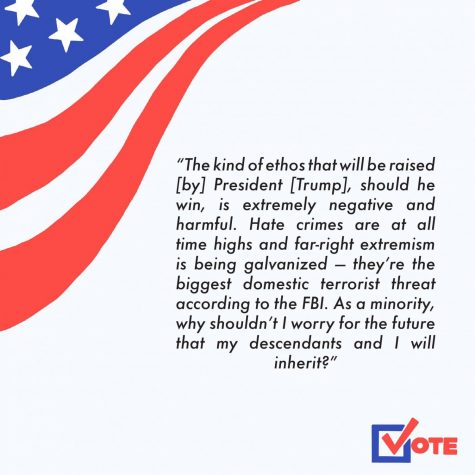
“In the past, some of the Republican judges have sided with left [wing politics] so that shows that they’re impartial when deciding these cases. I feel like [with] Amy Coney Barrett, if you’ve watched her hearings at all, she’s also said it’s case by case; that’s what [she is] going to judge off of. I don’t think anyone should worry about the majority in the Supreme Court because it’s been that majority for the democratic party as well,” Alba said.
BVH students once again had slightly conflicting views on one of the major matters that may soon be before the Supreme Court, the Affordable Care Act (ACA), commonly known as Obamacare. 58.2 percent of students said that the Affordable Care Act should not be repealed, while 26.4 percent said it should be repealed, something that the Trump administration has been pushing for. Under the ACA, 20 million people became insured by 2017, yet as of Oct. 2019, Trump has removed the individual mandate, allowed states to add employment as a qualification for Medicaid, eliminated subsidies to involved insurers, increased the access of short-term healthcare plans and cut funding for Healthcare.gov, according to a report by NPR.
“I don’t think I should be paying for someone else’s healthcare. I do think [that] the government should allocate some funds that are already there to healthcare but I don’t think that there should be any increase in taxes for me personally. [There should be no raises] even on taxes for businesses because that would directly come down to me and their consumer. If they raise the taxes, our prices would get raised. I’m fiscally conservative,” Alba said.
Alba belongs to the 19.7 percent of students who identify as conservative, while the majority – 56.1 percent – identify themselves as liberal. The percentage of liberals at BVH is almost identical to the percentage of students who feel that Biden will better manage the U.S. economy as our next president—56.9 percent of students. However, 10.5 percent more students than those who identify as conservatives felt that Trump would better manage the U.S. economy—31.4 percent of students. Alba also agrees with that 31.4 percent of BVH students, citing Trump’s tax policies as a draw for him.
“I want to be able to have the most money that I make to go towards future stuff because I’m going to go to college and work at the same time so those are bills that I will have to pay. I’d rather have more money than less,” Alba said. “If Biden wins, he will repeal the Trump tax cut which he already said before multiple times, so has his Vice President, and I think that will hinder my ability to be financially stable.”
The economy was one of the subjects discussed during the presidential debates, the first of which 69.7 percent of BVH students reported watching. Part of the reason that seniors like Cabal watched the first debate on Sept. 29 was because multiple social science teachers assigned it as an extra credit assignment, including Advanced Placement World History and International Baccalaureate (IB) History of the Americas teacher Jose Vallejo and Government and World History teacher Frank Schneemann.
“I thought it would be a chance for some of the kids to explore some of the issues that are involved [in the presidential election] but they didn’t do much talking [about issues] in that first debate, it was more like a lot of arguing. I didn’t assign the second one, but I really wanted them to learn about issues that people were talking about. They didn’t discuss the issues very much so it wasn’t a very good assignment,” Schneemann said.
Vallejo declined repeated requests for an interview with the Crusader.
Despite Schneemann’s disappointment with the first presidential debate, 68.8 percent of students stated that after watching the first, they planned on watching the second, which has since then taken place on Oct. 22. Similar to the partisan conflict, Schneemann described that from the first presidential debate, several BVH students like Alba reported losing friends or facing conflicts with peers over political beliefs.
“I’ve had liberal people [or] friends who have come up to me [and said] that we can’t be friends because we have different political views. I feel like that’s wrong. I thought we were supposed to be American first and Republican/Democrat second,” sophomore Daniela Radashkevich said.
Radashkevich identifies as a Conservative and would vote for Trump if she was eligible. As a minor and teenager, she feels that “a lot of people are getting too personal and emotional with this” upcoming election.
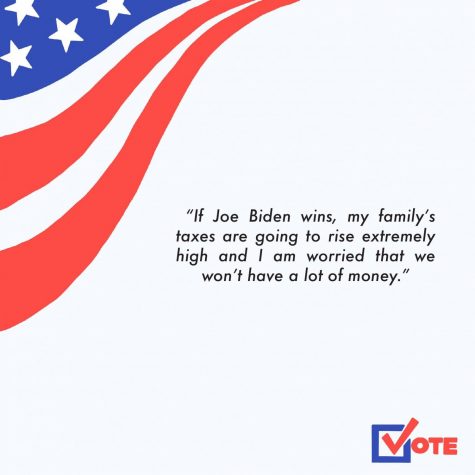
“I feel like political views should not define friendships and interpersonal relationships. Conservatives and liberals should be friends because you don’t know what you’ll learn. Political views are not a reason to hate a person,” Radashkevich said. “Maybe instead we should be listening to people and learn why that person believes in what they believe in, or maybe even having friendly debates.”
In addition, Radashkevich has not engaged in any social media activism, in contrast to students like Cabal, Alba and junior Clarisa Perez.
“I feel comfortable stating my political views [over social media] only because it makes other people more comfortable as well. If I’m more open, other people will be too,” Perez said.
Similarly to Perez, Cabal feels like “everyone [is] posting about” politics on social media, and thus, feels comfortable doing so herself.
“I am not able to vote, but I have been trying to spread information on why voting for Biden would be the best option for America. I post things on social media so that people can be informed on what would happen if Trump wins the election. Hopefully, it will encourage my friends to vote for Biden, even if they were not planning on voting,” Cabal said.
Despite the significant presence of politics on social media feeds, there are some students, like Carter, who feel uncomfortable using their social media accounts as platforms to share political beliefs.
“I do not feel comfortable being political on social media partly because of the current political climate. Students at BVH are very one-sided and if you think something different than them, you are considered a racist and should be canceled. It is because of this thought process that I do not feel safe sharing my political views, due to fear of being verbally assaulted and my future being ruined. I think people need to remember that not everyone shares the same views and we must accept that,” Carter said.
Alba, a Trump supporter like Carter, has experienced some backlash from posting his conservative views on social media, but continues to do so.
“I’ve said a couple of things on social media and it’s not been taken too well from people, but I continue to do it because it’s the first amendment, freedom of speech. I guess you could say [I’m] a constitutionalist,” Alba said. “Sometimes [I do it] to spread awareness. Sometimes on social media there is a lot of misinformation spread. I fact-checked some stories that have been posted on social media by other teens and it was just as simple as ‘let me google into this further,’ and [what I found] was ‘no, this wasn’t what happened.’”
Alba recommends that fellow teenagers use websites like factcheck.org to read beyond the headlines and find impartial news. Carter agrees with the importance of being well-informed on national politics.
“I have read more into the news and watched both the presidential and vice-presidential debates. I did this because I felt [that] it’s important to be informed. While I may not be able to vote this year, it is still important to know the current political climate in America and use past precedent for when I do need to vote,” Carter said. “I would say my goal and why I am keeping informed has been achieved because I am aware of the stances on both sides and what they believe in.”
One of the ways that Carter engaged with politics was through his IB Environmental Systems and Societies (ESS) class last year, taught by IB ESS and Accelerated Biology teacher Jennifer Ekstein. She makes it a rolling assignment to have students pre-register to vote once they turn sixteen, and also teaches about environmental policy in her classes.
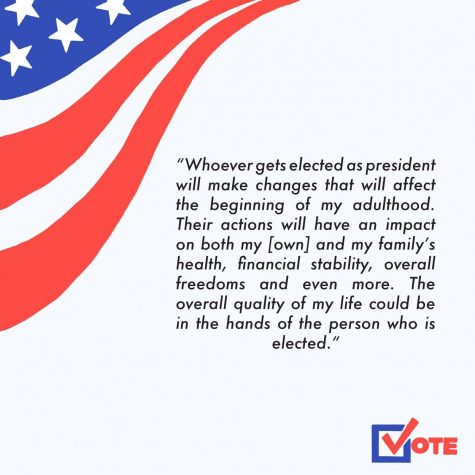
“We teach a curriculum at Bonita that needs to have climate change in there, but not everywhere in the United States do they get representation on climate change. [It is] part of the [Next Generation Science] Standards [(NGSS)], but there were a lot of states that didn’t want to teach NGSS and there’s a huge component on evolution and there’s a huge component on climate change. So there’s also political [factors] when it comes to teaching these things, [even though] they’re fact,” Ekstein said.
When it comes to the current environmental crisis, 76.8 percent of students believe Biden would manage it better as president, while 13.8 percent believe Trump will. Ekstein expresses her hopes in seeing that the future president and vice president “believe in the science” when making policies regarding the environment.
Meanwhile, as the official presidential election draws nearer and comes to a close on Nov. 3, students and the greater BVH community continue to handle a global health crisis and political turmoil. Although the majority of students will not be voting themselves, 29.7 percent somewhat agree that the integrity of the presidential election has been undermined. The majority of students, at 51.6 percent, felt “neutral” on this subject. Meanwhile, only 2.5 percent of students strongly disagreed with the statement that the integrity of the election has been undermined. Despite this, for students like Perez, the lack of their own ballot does not discourage them from unmuting and having their voices be heard.
“I’ve really tried to post and tell my friends who are above 18 to vote and [to] help anybody if they need help with voting. I’ve tried to give people reasons to vote,” Perez said. “I try to push through social media and make sure people know who they’re voting for.”
Impact on our students and the community
Although the results of the upcoming election will be the determining factor in a lot of potential changes that will affect the nation as a whole, a significant portion of students agree that the election will also impact the BVH community and the people in it. 46.7 percent of students do feel that they will be impacted personally by the presidential election’s results, although a majority felt the opposite way.
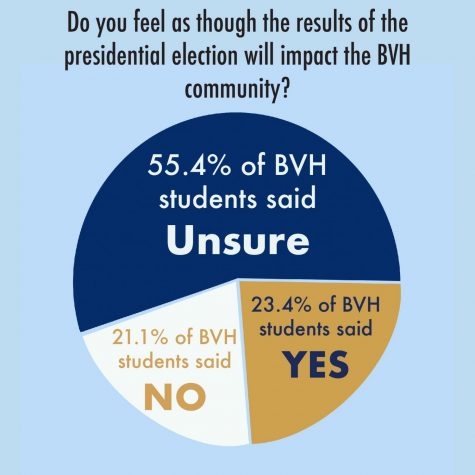
“They might be mistaken,” Schneemann said in reference to those students. “It’s kind of hard to talk about since we don’t know what’s going to happen after the election is over but it’ll probably affect our kids. I think it’ll affect everybody, with what policies are at stake. California is kind of set in its ways; there’s not much flexibility as far as California goes, but I’m not sure. It depends on what the candidates do.”
Out of the 23.4 percent of students who feel the BVH community will be influenced by the results of the presidential election, many voiced concerns about internal conflict, including Alba.
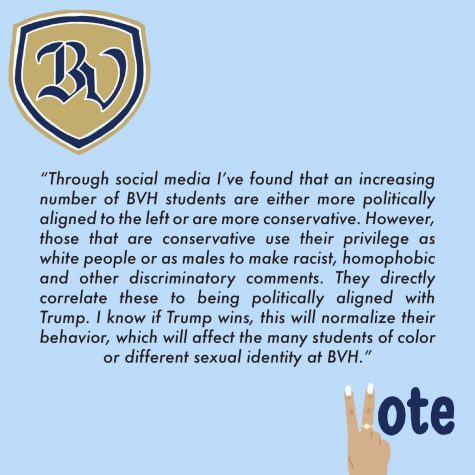
“I do feel like there will be some headbutting in our school no matter which candidate does win just because of different political views, and some people in our school are not open-minded; they’re not accepting of everyone. Personally, for me, I’ve lost a couple [of] friends already just because of my political views and I don’t think that that’s right,” Alba said.
Although the election and sharing political opinions amongst the student body have caused disagreement, it has also caused parties across the community to show their support and to voice their opinions. For instance, the San Diego County Democratic Party has chosen to endorse Biden and Kamala Harris. Concurrently, the Republican Party of San Diego has endorsed Trump for president. Within San Diego, Perez specifically feels that the BVH community’s diversity and inclusion will be impacted negatively.
“I feel like the BVH community would be affected heavily since there’s so much diversity amongst ethnicities and a lot of those families are going to be impacted. I’d hate to see those demographics suffer because somebody believes that they don’t deserve basic human rights,” Perez said.
The election will have an additional effect on the community through its relationship with the border and the subject of immigration. During the past four years, “The Trump Administration has secured funding for approximately 445 miles of the total 722 miles of border wall requested,” including 14 miles along San Diego for which construction has started, according to Promises Kept, a pro-Trump website and a KPBS report.
According to the San Diego Union-Tribune, “Few issues are as important to Trump’s political base as immigration. His get-tough approach and promise to build a border wall were cornerstones of his 2016 campaign. But attention to the issue has ebbed in the 2020 race, as Trump has focused more on unrest in Democratic cities, leftist activists and other matters.”
Despite this, several anonymous students vocalized their opinions on how BVH’s immigrant community will be impacted by four more years of Trump presidency. Both the immigrant and Latinx communities have also faced alarming rates of death during the pandemic. As the San Diego Union-Tribune reported in Oct., “COVID-19 led to widespread job loss and deaths, disproportionately borne by Latinos and Black Americans and hitting the agriculture, food-processing and healthcare sectors in California particularly hard.”
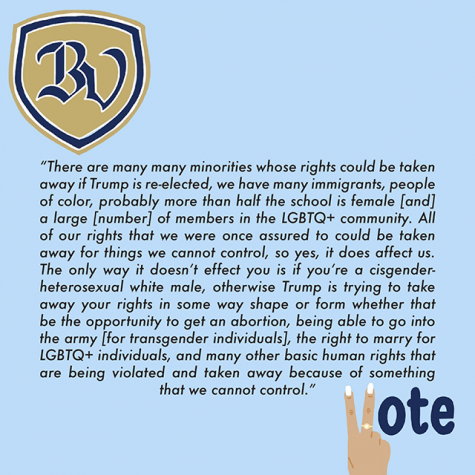
From another perspective, the results of the election could be a determining factor in how certain environmental issues are going to be treated further on.
“It really comes down to who gets elected. If Donald Trump gets elected again, then we’re going to see tremendous amounts of rollbacks when it comes to environmental protection. The good news though, is that a lot of what goes on in San Diego county, with the exception of federal lands, is owned by county and city, and I know the city of Chula Vista is very green,” Ekstein said.
The environmental situation here in Chula Vista is “way ahead of the curve” according to Ekstein, as the local government runs several clean energy programs and functions overall as a green city. However, strong national political leaders are still needed to manage the persistent global environmental threats, such as rising sea levels and temperature rises.
“Chula Vista is very green, but we’ll still have to worry about climate change, and we’ll still have to worry about sea-level rise. We have to elect leaders that go with fact and science, and not what I would call the ‘believers.’ There are what we call people who are believers, and those that go with the science. I vote for the environment. Go with the facts, go with the scientists [and] go with what they’re saying,” Ekstein said.
Furthermore, Ekstein recognized the issue of environmental justice as something that was also at stake in the presidential election. This subject was also discussed in the second and final presidential debate during which “Biden said he would take steps to confront environmental racism, and would protect people, especially in minority communities who ‘live near chemical plants and refineries that pollute,’” reported by the New York Times.
“Who is climate change going to impact the most? The rich, or the poor? The whites, or the [Black, Indigenous, People of Color] BIPOCS? Climate change… there is an inequity to it,” Ekstein said. “[Environmental justice] is a huge issue; this is one of the single most pressing issues for everybody in the world. It’s not just Americans, it’s not just people from Chula Vista or El Cajon, it is the single most identifiable threat to humanity in general and we have to take it seriously.”
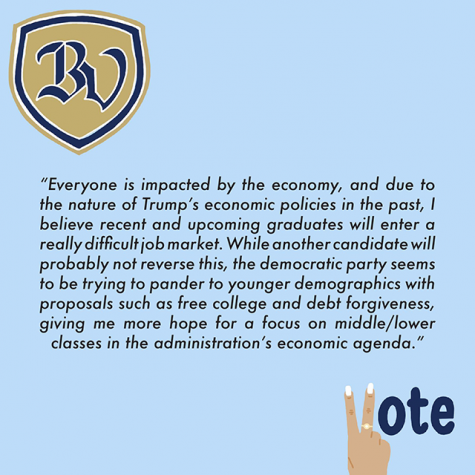
Environmental matters are just one of the major differences in opinions and approaches that the presidential candidates have. The contrasting plans of action both candidates have to manage the economy could also impact the taxation of certain financial classes more than others. Radashkevich, belonging to a family of the upper-middle class, disagrees with Biden’s taxation plans.
“Let’s say that Biden wins. From what I understand, he supports raising taxes for the people in the upper class rather than the lower class. A lot of people applaud him for that. However, I believe that raising the taxes on the upper class would cause a decrease in disposable income for most families which I would say is a generally negative impact. Trump overall supports the lowering of taxes which would cause an increase in disposable income for all and I believe that’s a really big impact,” Radashkevich said.
Despite similar disagreements with Biden’s plans, Alba emphasized the importance of accepting the results of the election.
“No matter who wins, I’ll personally respect that they’re the president. Will I be happy with the outcome? Maybe, maybe not, but [if] they’re the president, I’ll respect it,” Alba said. “I think that’s something a lot of people have to come to terms with, that the president did get elected. Even though you might not agree, you have to wait it out.”
While Trump himself has been unclear about whether he will accept the results of the election, Alba is primarily concerned that “the left” will not accept the election if Trump wins, while he believes that if Biden wins Trump will have no choice but to leave peacefully.
“Now, [about] Trump saying that he’s not going to go peacefully, I have heard that and I don’t agree with that. I personally don’t feel that he himself is not going to go. It’d be really easy to get him out of the White House and out of office, the secret service would definitely push him out,” Alba said. “I think [Trump]’s talking about if there’s an obvious voter fraud scandal, I feel like that’s when it’d be like ‘let’s investigate this first.’ That’s when he wouldn’t go peacefully, he’d kind of throw a bunch of stuff out there.”
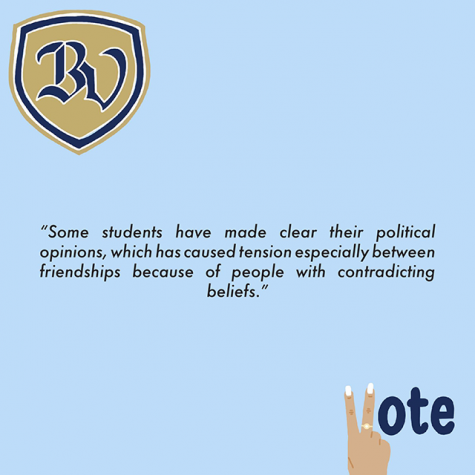
Along with tensions surrounding the integrity of the election, in the past few months, certain events have increased racial tensions in the U.S. The result of the election could have varying effects on these issues, and Perez believes that it will be an important factor in deciding the next president.
“Personally, I feel like I’m going to be impacted, not only because I don’t have any say in what happens since I’m not eligible to vote, but also because I am a woman and Hispanic. If this country takes a turn for the worst for those demographics, I’d definitely be affected,” Perez said.
Racism and racial justice have also been a major point of discussion in all three debates this fall, with Trump specifically receiving a lot of criticism after responding to a question about denouncing white supremacists by telling the Proud Boys to “stand back, and stand by.” This avoidance of certain explicit statements is also a concern for people like Alba and Schneemann. Schneemann, who first engaged with politics in 1940 as a kid campaigning for Franklin Roosevelt, feels that there has been additional uncertainty caused during this campaign season by candidates sidestepping “discussing the issues.”
“The candidates don’t want to really tell you how they stand on issues because they’ll lose votes. If they say they’re for guns then they’ll lose half the vote, if they say they’re not in favor of people having guns they’ll lose the other half of the votes,” Schneemann said.
Overall, students and staff within the BVH community acknowledge the complexity of this presidential election, and also the many policies and lives at stake. For many, however, staying united in spite of what takes place in the capitol is also of great importance.
“Just be accepting. If someone has a different belief than you it doesn’t mean that they’re still not a good person. You can support the policies and not specifically the person,” Alba said. “At the end of the day, it’s not just you and me voting, it’s the whole United States.”
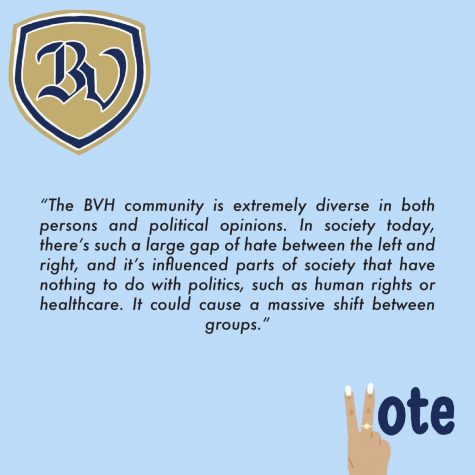
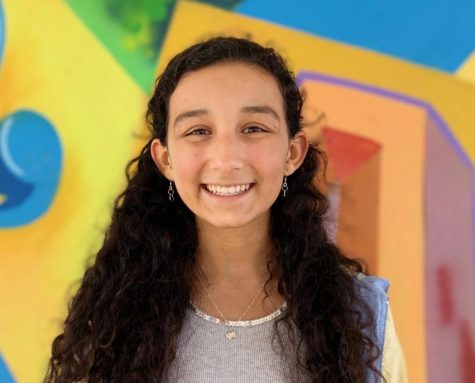
I am a senior at Bonita Vista High and a fourth year staff member on the Crusader. I am now co-Editor in Chief, and previously was News Editor, Features...
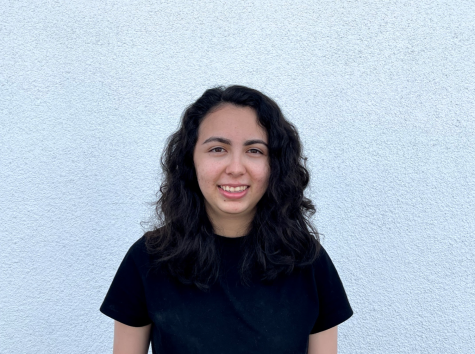
Writing can be a ridiculously painful thing to endure, but I think that giving it up would be even worse. After all, who doesn’t like a challenge? I’m...
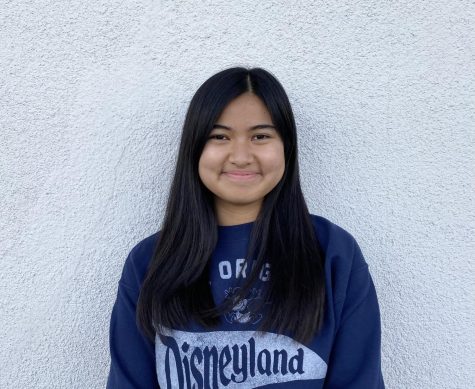
I am a senior at Bonita Vista High and a third year staff member on the Crusader. This year, I am co-Editor-in-Chief, and previously was Opinion Editor...

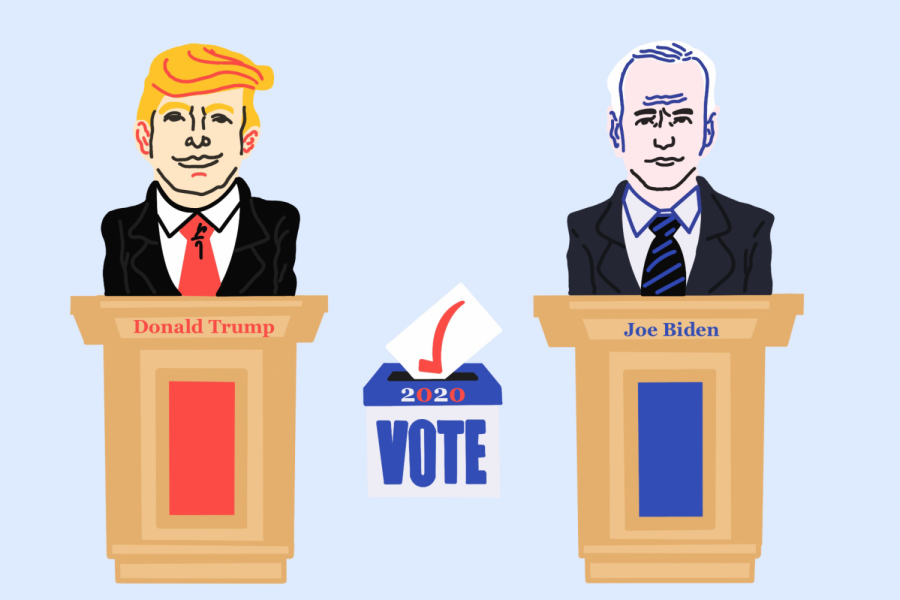
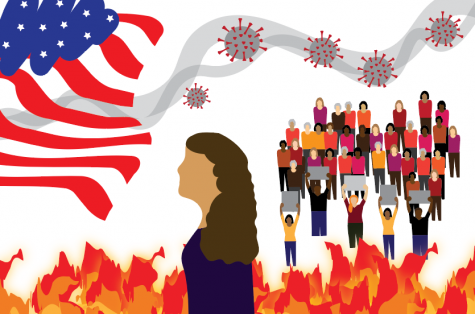
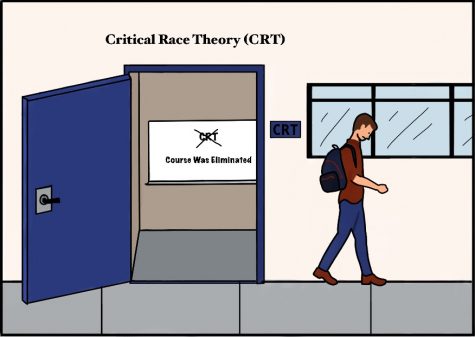
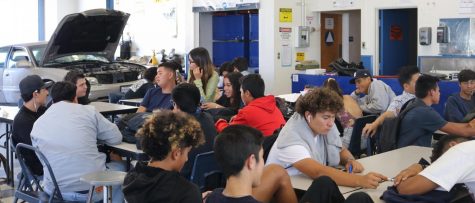
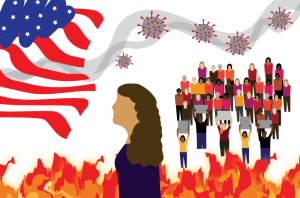
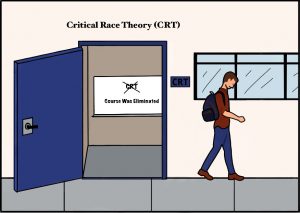
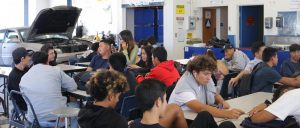
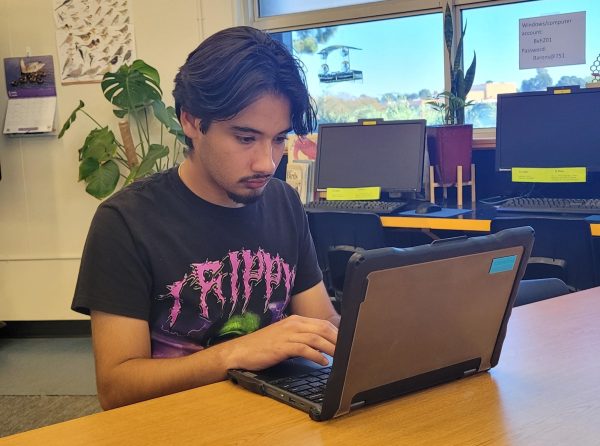
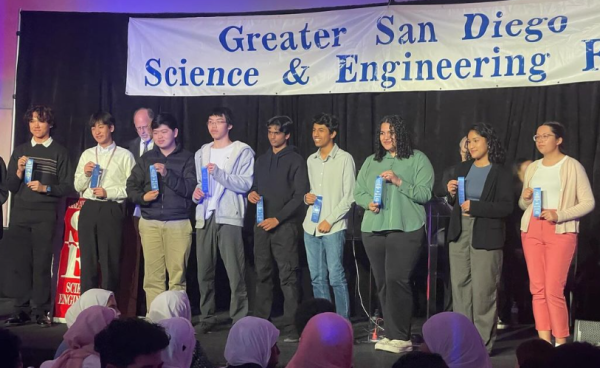
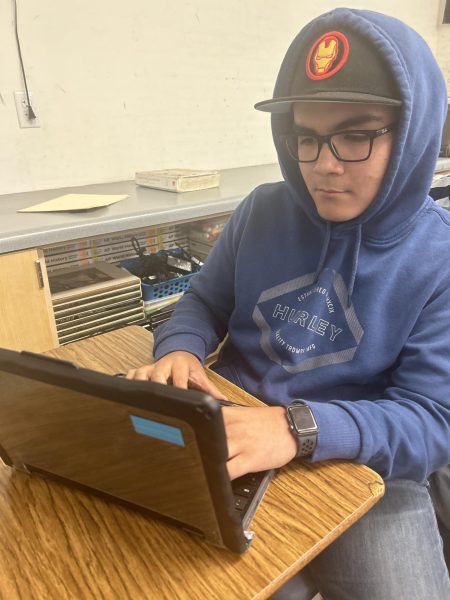
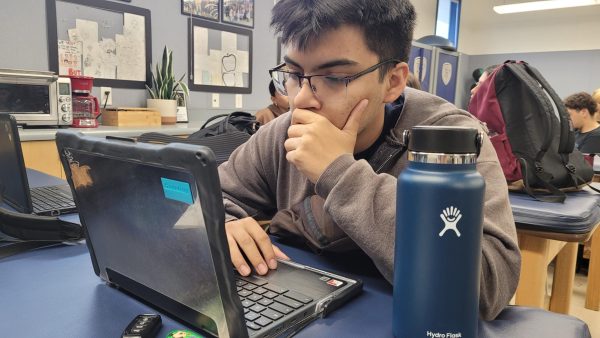
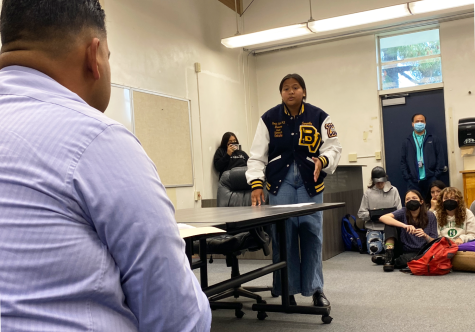
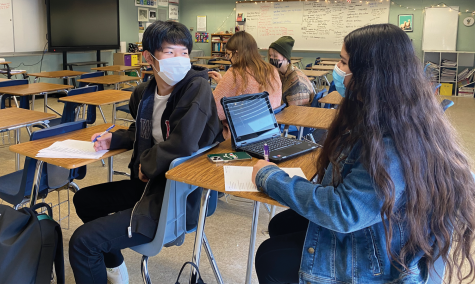
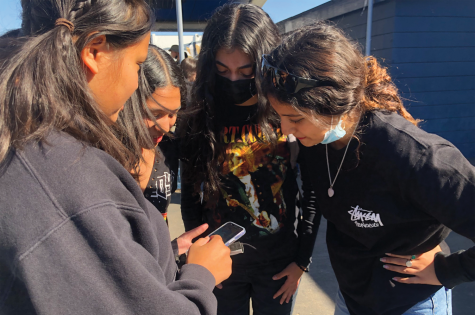
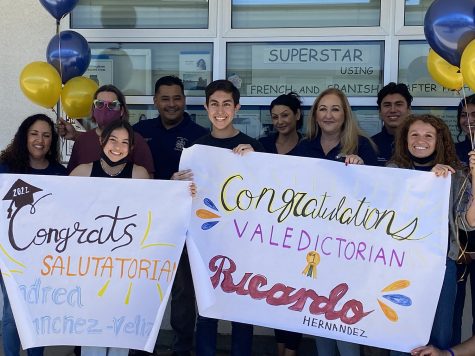
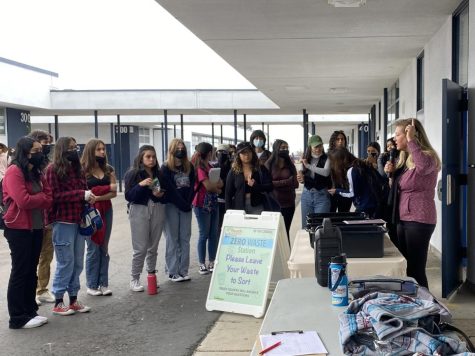

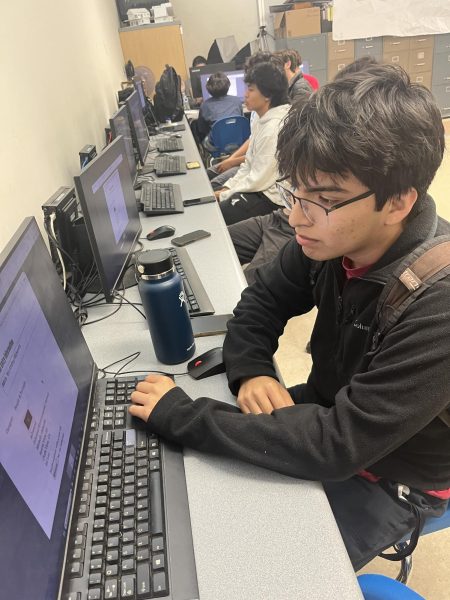
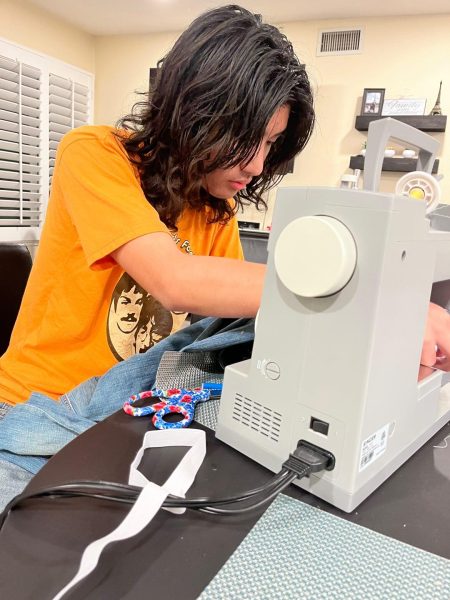
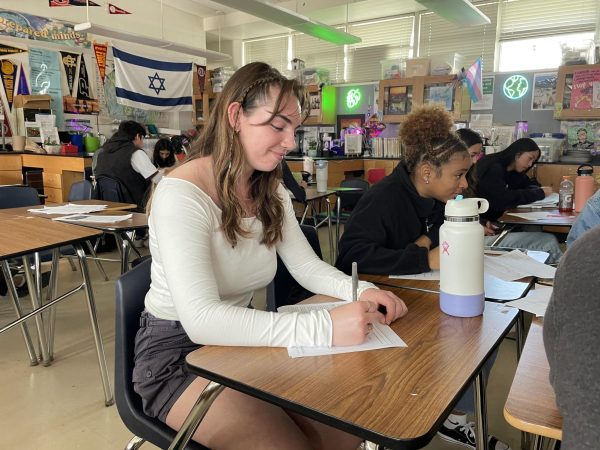
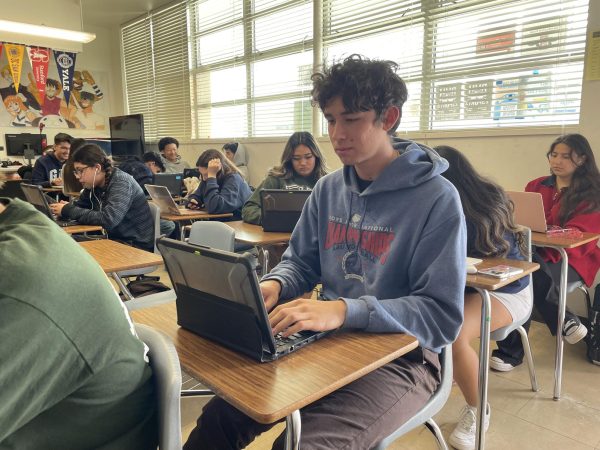
Carmel Weifert • Oct 29, 2020 at 6:24 pm
Thank-you for continuing to keep your student body informed in these challenging times!
Derek Czapek • Oct 28, 2020 at 12:09 pm
Excellent job Laurinne, Lucia, and Alexa. This is a well-written article with a profound level of research and original statistics. It is especially important today, specifically on the coronavirus’ effects on students.
However, I find it appalling that some who were interviewed blame an administration for lacking legitimate reopening plans, while they themselves contribute to the problem. Specifically, the quote “Trump believes schools should open up again because we are ‘close’ to getting a vaccine. Even though I would like to go back to school, I still would not feel comfortable. We can’t rely on every student and staff member to follow the safety protocols if we were to go back to school.” The same students who blame the federal administration for lacking interest in covid safety are also posting pictures with 20 other students unmasked on Instagram and Snapchat. Those same students hang out with others and contribute to the problem- I know more than five families who have contracted the virus from our school. Even our own ASB members post things like that. To blame an administration entirely for its issues and to also perpetuate the spreading of the virus is, in my opinion, ridiculous.
We need a collective movement to mitigate the spread of the virus. I completely agree, our government is not doing a good job in limiting the spread of the disease or even remotely listening to science. But shifting the blame onto a federal administration for local problems isn’t going to solve anything. People, and students at our school especially, need to recognize their responsibility in mitigating the disease in order to have a legitimate impact on the infection rate in Chula Vista. Do your part.